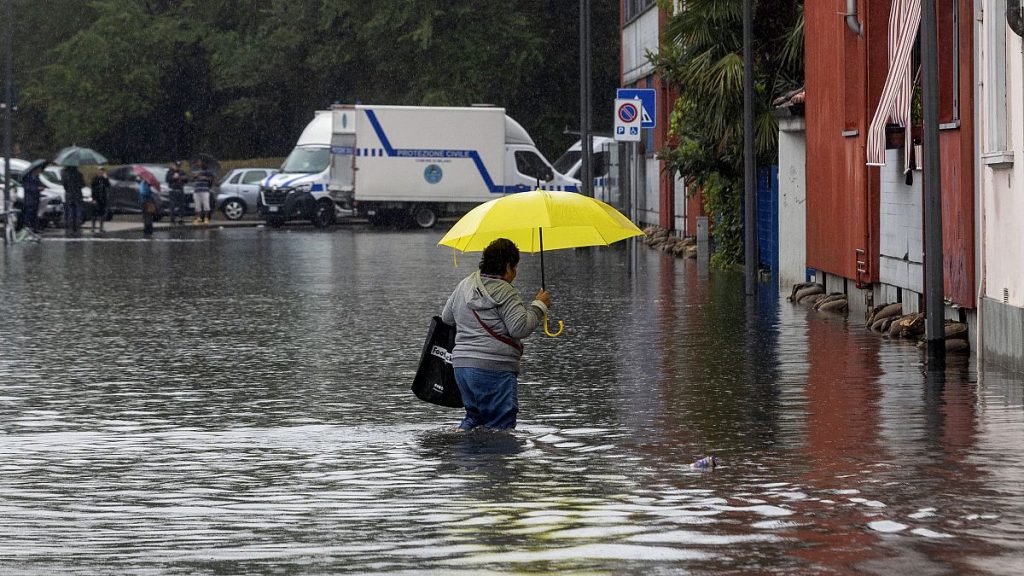Scientists are warning that the climate crisis is leading to an increase in extreme weather events, such as heatwaves, droughts, downbursts, and flooding in Europe and globally. Most recently, northern Italy has been hit by violent rainstorms, causing flooding in the financial hub Milan and leading to the rescue operation for a man who was swept away on a tractor in the Piedmont region. Other areas in the region, including Val di Susa, also faced overflowing rivers, collapsed bridges, and isolated villages. Lombardy and Veneto were also affected by widespread flooding, causing damage and disruption in Milan, where the Seveso and Lambro rivers overflowed. Firefighters had to rescue people trapped in flooded underpasses and drain basements filled with water, with some subway services being suspended due to the flooding.
As a result of the extreme weather events in northern Italy, the national broadcaster RAI captured footage of a man being swept away on a tractor in the Orco creek near Turin. Local rescuers were searching for the missing 58-year-old man. In addition, another river in Val di Susa overflowed, causing the collapse of two bridges, blocking a provincial road, and isolating approximately 50 people in two villages. The severe flooding in the region led to disruptions and damages, particularly in Milan, where Radio Popolare station went off the air for the first time since its establishment in 1976 due to flooding in its broadcast center. Scientists have linked the increase in extreme weather events like these to the climate crisis, as storms become heavier due to warmer air being able to hold more moisture.
In the midst of the extreme weather events in northern Italy, concerns have been raised about the impact of the climate crisis on the frequency and intensity of such events. Southern Italy has recently been facing a severe drought, causing significant issues for local agriculture and tourism, especially in the islands of Sicily and Sardinia. The drying up of water sources and lack of rain have been detrimental to farmers and businesses that rely on water for their livelihoods. The situation in southern Italy highlights the broader impact of the climate crisis on various regions, from flooding in northern Italy to droughts in the southern part of the country.
The flooding in northern Italy has also underscored the vulnerability of infrastructure and communities to extreme weather events exacerbated by the climate crisis. The collapse of bridges, blocking of roads, and isolation of villages demonstrate the importance of preparedness and resilience in the face of such events. The flooding in Milan, with overflowing rivers and submerged vehicles, has led to the suspension of services and disruptions in the city. The need for effective response mechanisms and infrastructure improvements to mitigate the impact of extreme weather events is critical to protect lives and property in vulnerable regions across Europe and worldwide.
In response to the severe flooding in northern Italy, local authorities and emergency responders have been conducting rescue operations and providing assistance to affected communities. In Milan, firefighters have been working tirelessly to rescue people trapped in flooded areas and drain water from basements. The suspension of some subway services due to the flooding has further highlighted the challenges faced in the aftermath of extreme weather events. The collaboration between local agencies and communities in response to these emergencies showcases the importance of coordinated efforts and preparedness in mitigating the impact of such events and ensuring the safety and well-being of residents in affected areas.
As the climate crisis continues to worsen, the frequency and intensity of extreme weather events like those seen in northern Italy are likely to increase. Scientists have emphasized the role of warming temperatures in causing storms to become heavier and more intense, leading to flooding, droughts, and other damaging events. The need for proactive measures to address the impacts of the climate crisis, including enhancing infrastructure, preparedness, and resilience, is crucial to protect communities and ecosystems from the consequences of extreme weather events. The recent flooding in northern Italy serves as a stark reminder of the urgent need to address climate change and its impact on vulnerable regions around the world.


